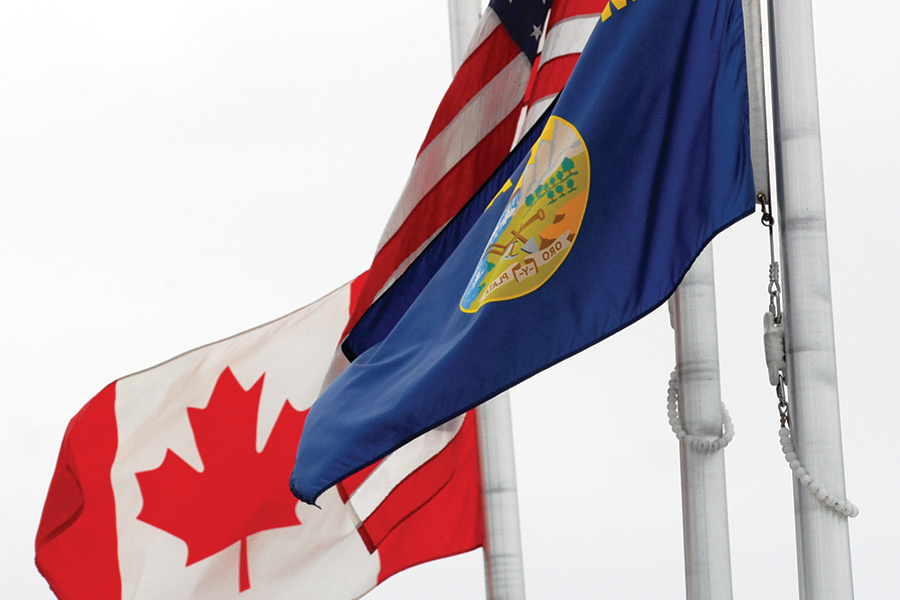On a rainy Monday morning in late May, the line of vehicles stretched almost 2.5 miles from the U.S.-Canadian border south along U.S. 93 past Trapper’s Saloon near Eureka.
It was Victoria Day at the Roosville Port of Entry and Mike Cuffe, the state representative serving Eureka and the surrounding area, wanted to see for himself something he had been hearing about from local business owners and residents. He walked among the vehicles and what he heard was a resounding complaint from Canadian visitors agitated by the long wait times.
“They were saying ‘Never again. Never again,’” Cuffe recalled recently.
Canadians are big business for border towns like Eureka. Last year 229,713 vehicles with 356,801 people traveled into Montana through Roosville, a 24-hour, 7-day-a-week border crossing station that funnels traffic from British Columbia and Alberta into the Tobacco and Flathead valleys. It’s the second most heavily used port in the state and 24th busiest northern station in the U.S., according to the U.S. Bureau of Transportation.
Yet with heavy traffic comes long wait times that can last for nearly three hours, leaving a bad taste in the mouths of visitors who might reconsider returning to Montana, according to Cuffe.
“Our main concern is the huge backup of traffic of folks returning to B.C. and Alberta at the end of three-day holidays, as well as growing backups during many summer days,” Cuffe said.
He added, “I consider this a vital issue to Eureka, and a big thing for the Flathead, too.”
Cuffe is spearheading an effort to work with the Canadian government to find solutions while gathering support on the American side. He has drafted fliers with contact information for members of Parliament in British Columbia and Alberta and has been passing them out at the border.
He’s come up with a few solutions that he thinks could solve some of the issues, including adding more staff to Roosville, creating a NEXUS card lane that would allow for expedited entry and adding a fourth lane for inspections that would be staffed during busy periods.
“The border staff are good people and it’s a stressful job. They are trying to work people through but they also have a job to do,” Cuffe said. “There are some things that I think can help.”
The present situation at Roosville can create a safety issue, too, Cuffe said.
“My constituents have complained and it’s a very obvious safety issue. There are a bunch of homes on that hill and at least three businesses that have driveways that are impacted,” he said.
In recent years an increasing amount of Canadians have been traveling to Northwest Montana, either as tourists or second homeowners, and efforts have been made to proliferate the cross-border spending, including marketing campaigns and reduced taxes for items purchased in the U.S.
But according to Cuffe, the current situation, with travelers being stalled for hours while returning home, is harming the flow of tourism and commerce.
“The Canadian dollar is big these days. It used to be a nice little addition. Now a lot of the industrial base, the construction base is gone and that makes the Canadian dollar even more important,” Cuffe said.
The Sweetgrass Coutts station north of Great Falls is often used an example of a busy port that operates efficiently and safely. The entry point has the benefit of being along U.S. Interstate 15, and saw 81,352 more vehicles cross into Montana last year than Roosville.
“In the grand scheme of things, this is probably a small out-of-the-way port,” Cuffe said.
But that doesn’t change the reality of the situation, he said.
He’s enlisted the support of others, including the Kalispell Chamber of Commerce. President Joe Unterreiner met with Sen. John Walsh last weekend to discuss economic issues that are important to the area. That included the long wait lines up north.
“I really appreciate Rep. Cuffe staying on top of that and keeping us informed of what’s going on. Down here we get reports from visitors and residences about the long wait times,” Unterreiner said. “Any time you have that, it’s an issue. It puts a damper on things when you get hung up at the border.”
